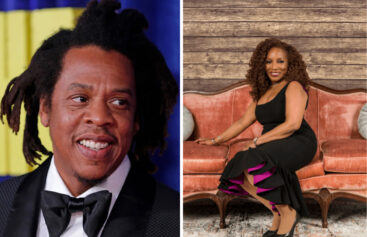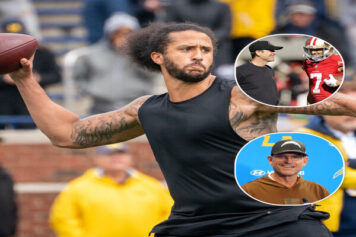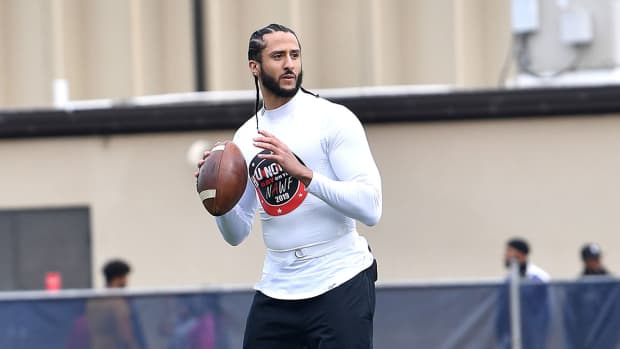The sports world was put on notice last week when African-American football players at the University of Missouri joined protests that successfully forced school president and chancellor to step down because of their dereliction in addressing the racism that black students were enduring on campus.
These young men, some of them barely out of high school, summoned enough courage to risk their college scholarships for a cause that transcends the multi-billion dollar industry that is the NCAA. Their action should inspire those in the professional ranks to conduct themselves with a similar sense of social activism.
When Cleveland Browns wide receiver Andrew Hawkins wore a Justice For Tamir Rice T-shirt last December during pre-game warm-ups, he called attention to the reality that his young son could be a victim of senseless police brutality.
“That little boy is my world,” Hawkins said to reporters when asked why he wore the shirt. “My number one reason for wearing the T-shirt was the thought of what happened to Tamir Rice happening to my little Austin. And that scares the living hell out of me.”
Hawkins fears are warranted. As of June 1st, black Americans are more than twice as likely to be unarmed when killed by police, according to The Guardian. And while black school-age children are just 16 percent of student enrollment, they represent 27 percent of students referred to law enforcement.
So often, we tend to look at athletes as super-humans. But being black in America can ground any superstar. In the middle of being in awe of Stephen Curry‘s scoring spree in the NBA, we never imagine that he could end up like Thabo Sefolosha whose run-in with the NYPD left him with a broken leg. Ironically, Sefolosha was charged with assaulting NYPD cops and stood trial. Sefolosha won that case and is now suing the force for racial discrimination.
As a sign of corporate solidarity with its mostly black players, it would make sense for the NFL to sponsor a #BlackLivesMatter month. For those who will suggest that such a move is too radical for the league, consider that it has already taken a number of social stands.
It sponsors Breast Cancer Awareness Month and the #NoMore campaign, which features current and former players speaking out against domestic violence. The league’s focus on women’s issues is more business than moral; 45 percent of the league’s fan base is female.
The NFL did not want to alienate that crucial base by giving the impression that it doesn’t care about violence against women in light of a few players’ well-publicized cases of abusing women.
A similar consideration could be made for addressing racism. Given that the league is 68 percent black, would such a move seem that out of step?
At the very least, it would signal to its mostly white, male, conservative base that it values the lives of the players beyond the football field.
Will such a move be met with resistance? Of course, it will. Backing a radical ideal like #BlackLivesMatter month will have white fans wondering how they can engage such a contentious issue, but I think many black players would welcome those difficult conversations–especially if they band together and demand it.
Sports have been one of the most powerful unifying forces our nation has known. Though Jackie Robinson endured racial abuse that was nearly unbearable when he integrated baseball in 1946, he was the ideal person to take on the travails of being the first black player to swing a bat in the Big Leagues since 1884.
Think about the black players at the University of Texas-El Pasos basketball team (formerly Texas Western) who formed the NCAAs first all-black starting five that went on to win a national championship in 1966. Those players endured near-intolerable racial environments as they paved the way for black athletes to form starting line-ups at other major basketball programs. The professional and college sports worlds have plenty of examples of pushing the envelope when it comes to race.
If the league would support #BlackLivesMatter, it would encourage its fan base to discuss very complex issues of race with the black players whose jerseys they wear and teams they support. Not all players may be comfortable with the idea of appearing in a PSA saying, Black Lives Matter, but enough of them would likely be more than happy to do so.
There will be critics who will claim that the league is too old, white and corporate to take on such an idea; the NBA, which has a higher percentage of black players and fans, would be a more suitable fit.
But I don’t think so.
The stand that black players took at Missouri revealed how much power athletes have to push any social agenda they please, no matter how challenging it may be. Why can’t guys at the next level take it a step further by leading constructive dialogues about structural racism?
It shouldn’t be too difficult for the NFL to support #BlackLivesMatter if most of the players it employs are susceptible to ills of racism that befell black men and women like Eric Garner, Rekia Boyd, Walter Scott and many others.
https://www.instagram.com/tv/CBDvH9FnAsZ/?utm_source=ig_web_copy_link
The League would prove itself to be a national leader in the sports world and beyond by backing a month that highlights how America can better address race relations. Such a move would also prove that the league is as passionate about advocating for its players’ lives as it about cheering for their success on the field.



